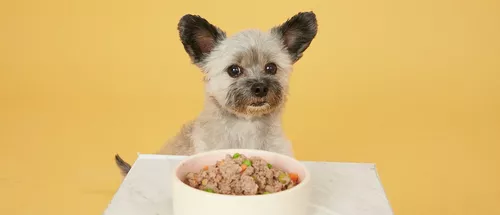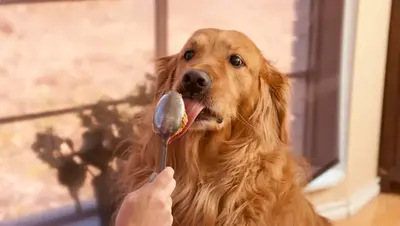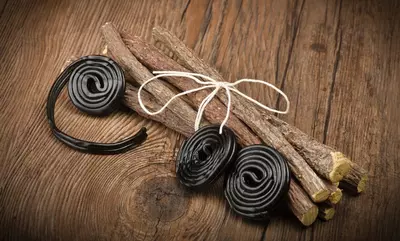What Is Grain Free Dog Food?
- 19 Dec 2019
- 6m read

Grain free dog food is, you guessed it, made without including grains, such as wheat, barley, oats and rice. These ingredients are usually replaced with complex carbohydrates, such as sweet potatoes and lentils, as an alternative energy source.
The use of grains in dog food was heavily popularised during WW2 as an inexpensive filler to increase bulk. Fast forward to the present day, where we know a lot more about a dog’s nutritional needs, and you’ll see the use of certain grains, becoming less and less popular in dog food.
While the ingredients in human food legally must be individually listed, pet-food manufacturers don’t have to spell out the exact contents of their products. So, when you see 'cereal' on a dog food label, the grains used can vary from batch to batch. Unfortunately because of this, manufacturers often take advantage of market prices and use the cheapest grain available, with very little consideration of its nutritional benefit.
We'd welcome you to compare that with the clear, short list Butternut Box’s recipes. Our ingredient list is fully transparent, we list every single ingredient we use, from things like 60% human-quality pork, right down to a pinch of sage and thyme.
Is Butternut Box Grain Free?
Here at Butternut Box, we opt for grain-free in most of our meals but we do have some recipes, such as Tuck in Chicken and Pork of the Town, which include high-fibre pearl barley and protein-packed quinoa. Both of these ingredients can help to promote healthy gut bacteria and support the digestive system. They also include several B vitamins and Vitamin E, which help to maintain healthy skin and eyes, as well as aiding your dog in fending off any unwanted illness and infection.
However, all of our meals are hypoallergenic and contain no added wheat, maize, soy or other mystery ingredients. By having a variety of recipes we can provide options for all of our customers, depending on your individual preference, as well as your dog’s own nutritional requirements.
We know that there are certain pooches that are better off without grains in their diet, even if they are the best kind. Dogs with certain conditions such as IBS and struvite, require a specialised diet. We would always recommend consulting with your vet before choosing a food for your dog.
Is Grain Free Food Good for Dogs?
Even though dogs don’t suffer from Coeliac disease in the same way as humans do, some dogs can display certain symptoms when they eat grains, which can indicate dietary intolerance.
You may have never considered the possibility of your dog having an intolerance, but if any of the following symptoms sound familiar it’s likely that something is disagreeing with them. Opting for grain-free could help your dog woof farewell to those irritating complaints that go hand-in-paw with food intolerances, such as:
Itchy, red skin
Rashes
Skin infections
Fur loss
Vomiting
Diarrhoea
Sneezing
Coughing
Most breeds have evolved to produce the enzyme that allows them to digest starch. This means that dogs can, for the most part, process grains without any problems. But there are exceptions. Breeds that have Arctic and Japanese origins, like the Siberian Husky or Alaskan Malamute, have as few of these enzymes as their wolf ancestors.
Should I Feed My Dog Food with Grains?
If your dog never, or rarely, suffers from the above symptoms it is likely that they don’t have a problem when it comes to digesting grains. This ultimately means you’re free to opt for food with or without grains, perhaps finding some sort of happy medium so that your pooch can enjoy the benefits of both.
If you choose to feed your dog a high quality food, such as Butternut Box, you can be rest assured that regardless of which option you choose, your pup will be receiving all of the nutrients they need to thrive.
Added variety
As the old saying goes, variety is the spice of life. This doesn’t just apply to us humans, but extends to our pooches too. As incredibly sensory creatures, giving your dog a selection of different tastes and textures is sure to put them into overdrive. Pearl barley for example will give a nutty, sweet taste with a pasta-like, chewy texture. The perfect addition alongside high-quality meat and vegetables.
Protein power
For the same reasons that it’s essential for humans, protein should make up a large portion of your dog’s diet. Whilst meat and fish are often the main protein sources, other ingredients such as quinoa can provide an additional protein-boost to any meal.
Why Choose Grain Free Dog Food?
If you’re unsure whether or not your dog requires a grain-free food, it’s useful to be aware of the main reasons behind why, in some cases, it may be recommended as an alternative diet.
Easier digestion
Heavy use of certain grains in dog food can upset the delicate balance in your dog’s gut and aggravate existing conditions, including irritable bowel syndrome. Many grains, such as wheat, corn and maize can be highly indigestible to dogs, wreaking havoc on their digestive system.
Unfortunately, this issue often presents itself in a sloppy mess that is near-impossible for us to pick up. Your dog’s poop is the most important sign of digestive health. If they are producing anything other than a lovely log, it might be time to switch up their diet.
Increased energy levels
The use of alternative, low-GI carbohydrates, such as pearl barley, quinoa, lentils or sweet potatoes in dog food means that energy is released slowly. This means that your dog will be sustained for longer and is less likely to show signs of lethargy throughout the day. It could also mean more playtime requests, so be warned. High-GI carbohydrates, on the other hand, cause a quick energy spike followed by a nasty crash and burn.
Help with controlling health conditions
There are a multitude of health conditions in dogs that can be helped by a grain free diet. Diabetes, for example, often requires a low-carb, higher-fat diet to help manage insulin production.
Similarly, dogs with pancreatitis can benefit from a grain-free diet. With this condition, the main focus is to minimise pressure placed on the pancreas to allow it to heal. Some grains can cause the pancreas to be overworked as they take more effort to digest, resulting in some nasty symptoms for your pooch.
Is Grain Free Dog Food Suitable for Puppies?
Yes, grain free food is suitable for puppies.
However, as your pup grows they need quality energy sources to fuel growth and development. If you opt for grain free, it’s important that plenty of energy is supplied through a mixture of proteins and complex carbohydrates. We would always recommend consulting with your vet on the subject, as they can help you to decide what the best course of action will be.

.webp)


